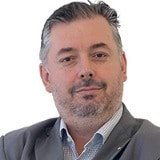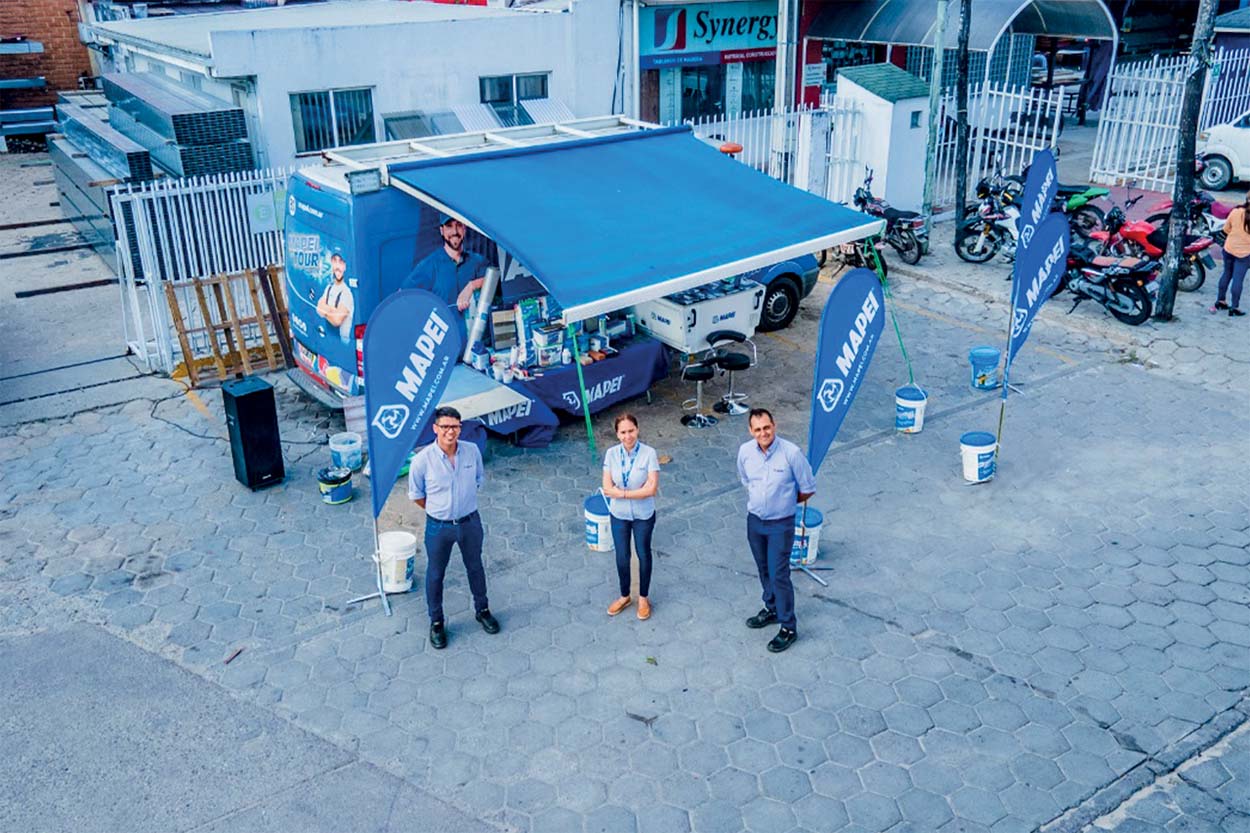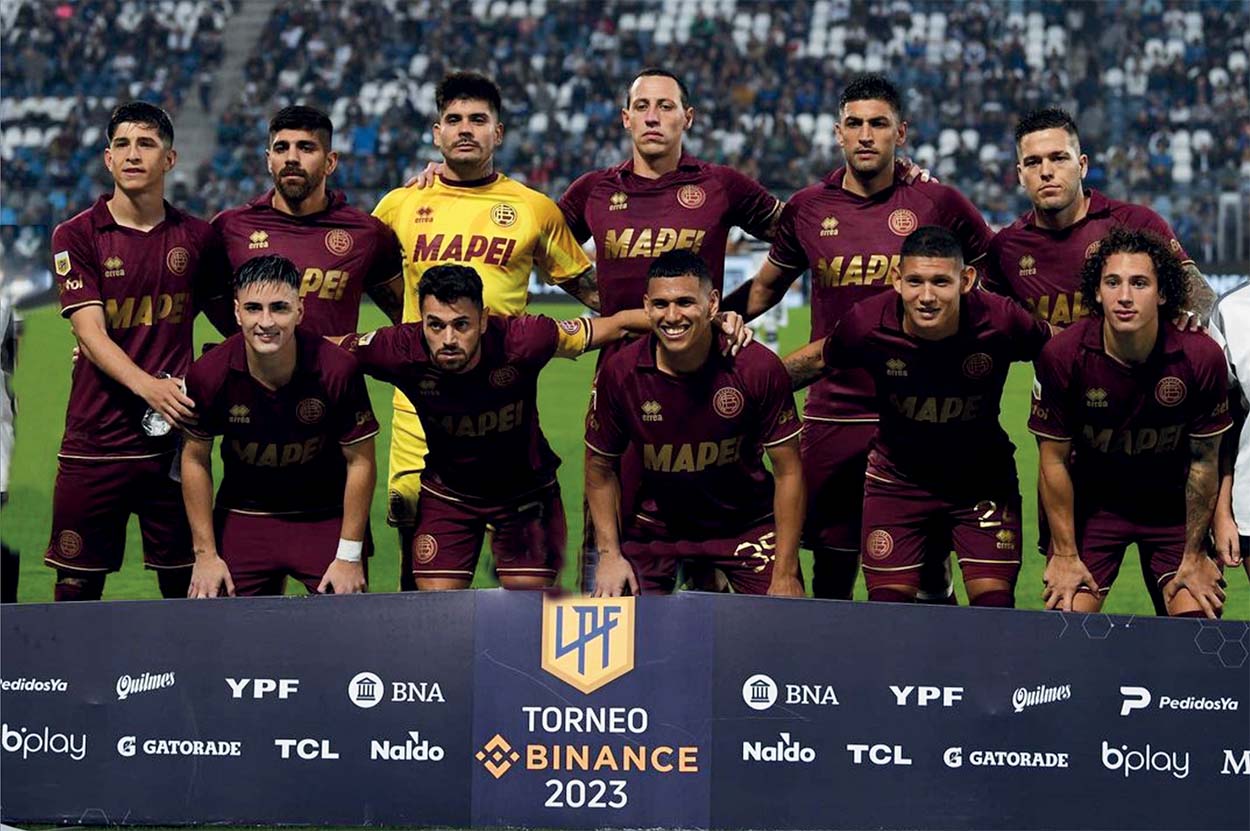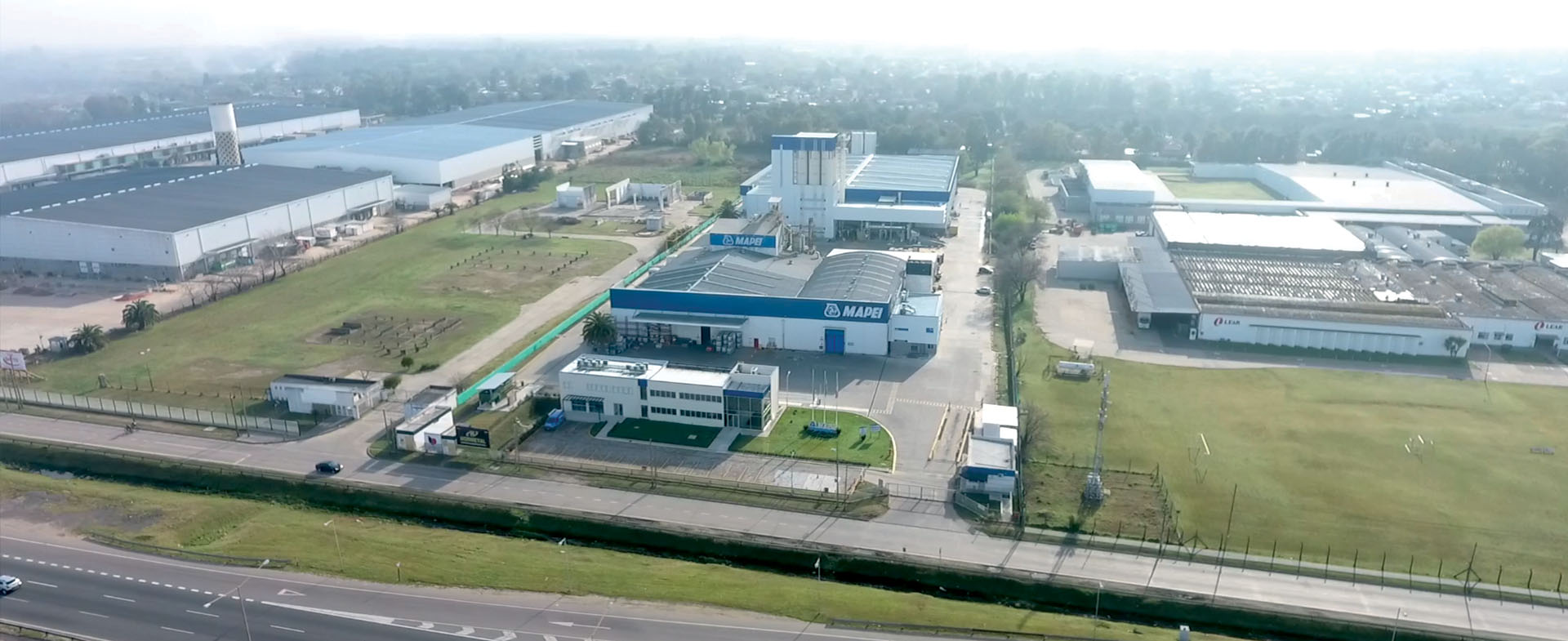
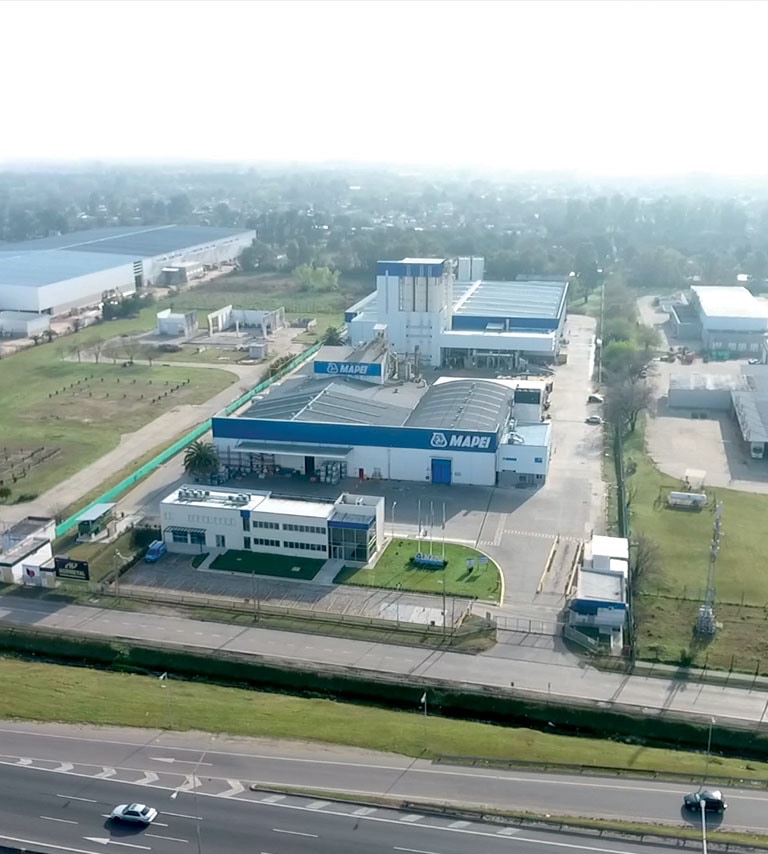
Mapei around the World
/
8/1/2023
Argentina strategic in challenges
Interview with Gabriel Ros, General Manager Of Mapei Argentina: we plan to boost our operations in Chile, Uruguay, Paraguay and Bolivia in 2023
Mapei introduces the Argentine subsidiary through the words of its general manager
Mapei has been operating in Argentina for over 20 years. How do you assess operations carried out so far?
The Mapei Group started its operations in Argentina in 1999 with the take-over of a local company, which was renamed Mapei Argentina S.A. Since then, we have grown in terms of our facilities, human resources, turnover, production lines and the quantity of materials marketed. Today, the company is involved in the manufacture and sale of systems for the building industry, thanks to a manufacturing facility in Escobar, in the province of Buenos Aires, which has two production plants, a Research & Development laboratory and training centre. In addition, it has two distribution centres in Cordoba and Mendoza. Thanks to these operations and 169 staff, last year Mapei Argentina managed to achieve revenue of 51.8 million Euros and manufacture 137,000 tonnes of materials, meeting the needs of 1,300 customers in Argentina, Chile, Uruguay, Paraguay, Bolivia and Brazil.
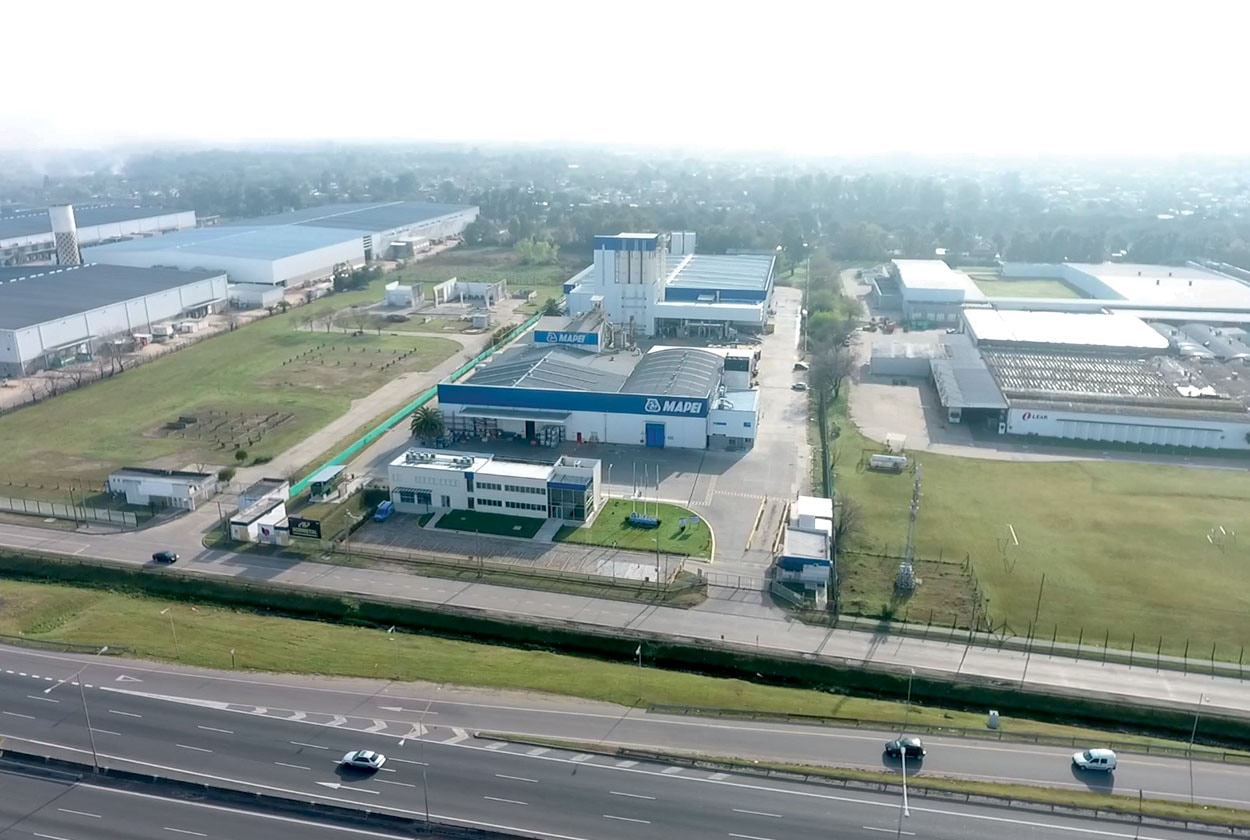
The Mapei Argentina manufacturing facility is located in Escobar and ecloses two plants.
What projects is Mapei Argentina planning to expand both industrially and commercially over the next few years?
Underlying the Group's internationalisation strategy is Mapei's proximity to every market and geographical location. As far as South America is concerned, we are taking on a new challenge at the start of 2023: the creation of the "Latin American Region - Southern Cone" in the Mapei Group, which is aimed at boosting our operations and working more closely with those markets where we believe have plenty of potential for growth, such as Argentina, Chile, Uruguay, Paraguay and Bolivia. From 1st January, in addition to my job as General Manager of Mapei Argentina, I also hold the position of Regional Director of this new division. The strategy behind this policy is to keep working closely with clients who have contributed to our process of growth. That is why we have devised a plan that we will update year by year, pursuing new goals involving every sector of the company. The real challenge is to continue to grow in Argentina and promote the same strategy in the other countries in this new cluster, such as those closest to us (Uruguay, Chile, Paraguay and Bolivia), which, as well as having excellent economic potential, fit in well with Mapei's DNA. The aim is to offer each market and each client the best possible products and solutions for the building industry. The project is stimulating and challenging, and we are sure that it will make the Mapei brand an even greater force to be reckoned with in this region over coming years. Among the goals for 2023 is the construction of a new manufacturing plant, which will become operational during 2024. It will be located in the province of Santiago del Estero in north-central Argentina and will have a manufacturing output of 40,000 tonnes per shift. On one hand, we hope this new facility will embody the company's philosophy of catering more closely for the needs of local markets, e.g. by reducing transport costs for clients in the central and north-eastern part of the country and neighbouring countries. On the other hand, we intend to incorporate new technologies into our manufacturing processes, bringing them in line with the Group's stringent quality standards.
51.8
million Euro (Turnover in 2022)
66.4
million Euro (Turnover forecast for 2023)
169
employees
190
million tonnes (current manufacturing output)
1.400
clients in 2023
1
manufactoring facility in Escobar (And 1 under construction in Santiago Del Estero)
2
distribution centres in Cordoba and Mendoza
"Among the goals for 2023 is the construction of a new manufacturing plant, which will become operational during 2024"
Inflation is galloping at 100% year-on-year: Argentina is one of the countries in the world with the highest inflation rates. What are the strategies a major company has to adopt in a place in this context?
The scenario is complex, and it is difficult to explain the dynamics of our market to someone who is not part of it. Suffice it to say that, during 2022, Mapei Argentina updated its price list 11 times. It sounds crazy but we are used to this. We cannot fight against rising prices, but we can adapt to where we operate. With the right tools, it is even possible to exploit the situation to boost sales. The strategy we adopt focuses on price management and cost reduction. High inflation levels have been a more or less constant variable in the Argentine economy for the past seven decades. From 1944 to 2015, we witnessed an average rise in prices of 76% year after year. This means you need to know what to do when prices rise in order to achieve long-term growth in a context like this. Our strategy is based on three principles, the first of which is the most important:
Sell more, i.e. engage more with our customers. A classic example is the availability of products in stock. We cannot sit back and wait, instead we have to be flexible and offer intelligent solutions, such as a good mix of products. A typical feature of high inflation settings is having no base-line prices.
Collect more. Debt collection management becomes essential when prices rise. So, in times of high inflation, we must devote even more effort to reducing collection times. The sales force and, in fact, the entire company is involved in this kind of work.
Reducing costs. When prices start rising across the board, it is difficult to bring costs down. We must therefore have a clear idea about the average annual rate of inflation and ensure that our costs rise at a lower rate. In this context, price increases actually turn into an opportunity to optimise operational processes and focus on operations that can lead to savings.
The Argentine economy is enshrouded in uncertainty. There is, however, one encouraging fact: in 2023, the World Bank expects GDP to grow by 2%. If this happens, it will mark a streak of three consecutive years of growth; something that has not happened since 2008. Which sectors are driving this positive trend?
According to some economists, Argentina will have one of the highest economic growth rates in the entire region in 2023. Data from the world economy forecasts growth in 2023 (+2.9%) and 2024 (+3.2%) to be lower than in 2022 (3.4%) and lower than the average growth recorded from 2000 to 2019 (3.8%). This is because the post-pandemic economy has changed the world structurally and the Russian-Ukrainian conflict is causing uncertainty, inflation and debt. Argentina is an economically complex country because it has limited resources, a large fiscal deficit and no international financing. This puts the national economy in a tricky position in terms of financial operations because it has no dollars for import purposes. The private sector finds it difficult to finance projects because funds are absorbed by the state and considerable financial pressure deters entrepreneurs from investing. In this context, the building industry, which grew by 5% in 2022, is now facing a year of political uncertainty and high inflation. As elections will be held in 2023, experts warn that public investment should stimulate an industry that has not seen much progress for months. High inflation, changing exchange rates and national elections can only cause a climate of understandable uncertainty. It is equally clear, however, that the building industry is evolving towards more sustainable processes, technologies and materials and that 2022 was, generally speaking, a good year for this sector.
"A CLIMATE OF UNCERTAINTY REMAINS IN THE COUNTRY, BUT THE CONSTRUCTION INDUSTRY IS EXPERIENCING AN EVOLUTION TOWARD MORE SUSTAINABLE PROCESSES, TECHNOLOGIES AND MATERIALS."
From residential buildings to infrastructures and works linked to tourism: where are the biggest business opportunities for Mapei?
Mapei has taken part in the construction of numerous prestigious works such as Ezeiza and Jorge Newery airports, Puerto Belgrano naval base, Córdoba ring road, the Four Seasons Hotel in Buenos Aires, the Sheraton Hotel in San Miguel de Tucumán, the Catholic University of Argentina, Paseo del Bajo motorway and numerous tunnels. Some of these were built in partnership with major Italian construction companies, as in the case of the tunnels in Matanza-Riachuelo basin, Arroyo Maldonado sewage system and Sarmiento underground railway line.
Which product lines are you focusing on to grow?
Mapei Argentina is committed to contributing to the growth of the construction industry, its sustainability and evolution, partly through the development of new products and solutions. It is true, however, that "the heart" of the company is currently linked to its line of products for installing ceramic and stone materials. In recent years we have launched over 400 products from this range in Argentina, which is currently the most successful for our market. But we also perform well on the market for concrete admixtures and cement additives (C-ADD). Furthermore, over recent years we have expanded on those segments of the market focused on building materials, structural strengthening, waterproofing, sealants, elastic adhesives and underground construction products. The challenge for us now is to continue to launch new lines and products. This year we plan to launch a range of wall coatings and thermal insulation systems. At the same time, we look forward to launching new products and lines manufactured by the Group on markets where we do not currently operate, providing our clients with an increasingly complete and customised range of products.
How is the distribution of Mapei products organised in a big country like Argentina?
Argentina is indeed a very large country covering 2,795,677 km2, extending for 3,700 km from north to south and 1,400 km from east to west. Although most of the population is concentrated in the central belt, Mapei is determined to guarantee proper coverage of every part of the country, even the most remote areas. That is why we rely on a sales force of 40 staff divided into three areas, one of which is dedicated to distribution, since the supply of products to our clients is mainly through distributors in three large business areas. In other realms there is greater autonomy: for example, the concrete admixtures line and exports are managed directly by special staff and deliveries are mostly made directly. The entire sales force is supported by a strong Technical Services team made up of 12 experts.
ITINERANT TRAINING: MAPEI ARGENTINA INVESTS IN MARKETING AND TRAINING ACTIVITIES TO CONTINUE TO GROW IN THE LOCAL MARKET. GREAT COMMITMENT AND RESOURCES ARE DEVOTED TO TRAINING: IT HAS TWO TRAINING CENTERS IN ESCOBAR AND CÓRDOBA, WHERE COURSES ARE HELD BY THE MAPEI ACADEMIA, AND TWO VANS THAT TOUR THE COUNTRY TO TRAIN AND INFORM BUSINESS PARTNERS AND OTHER SPECIALISTS ABOUT MAPEI PRODUCTS AND TECHNOLOGIES.
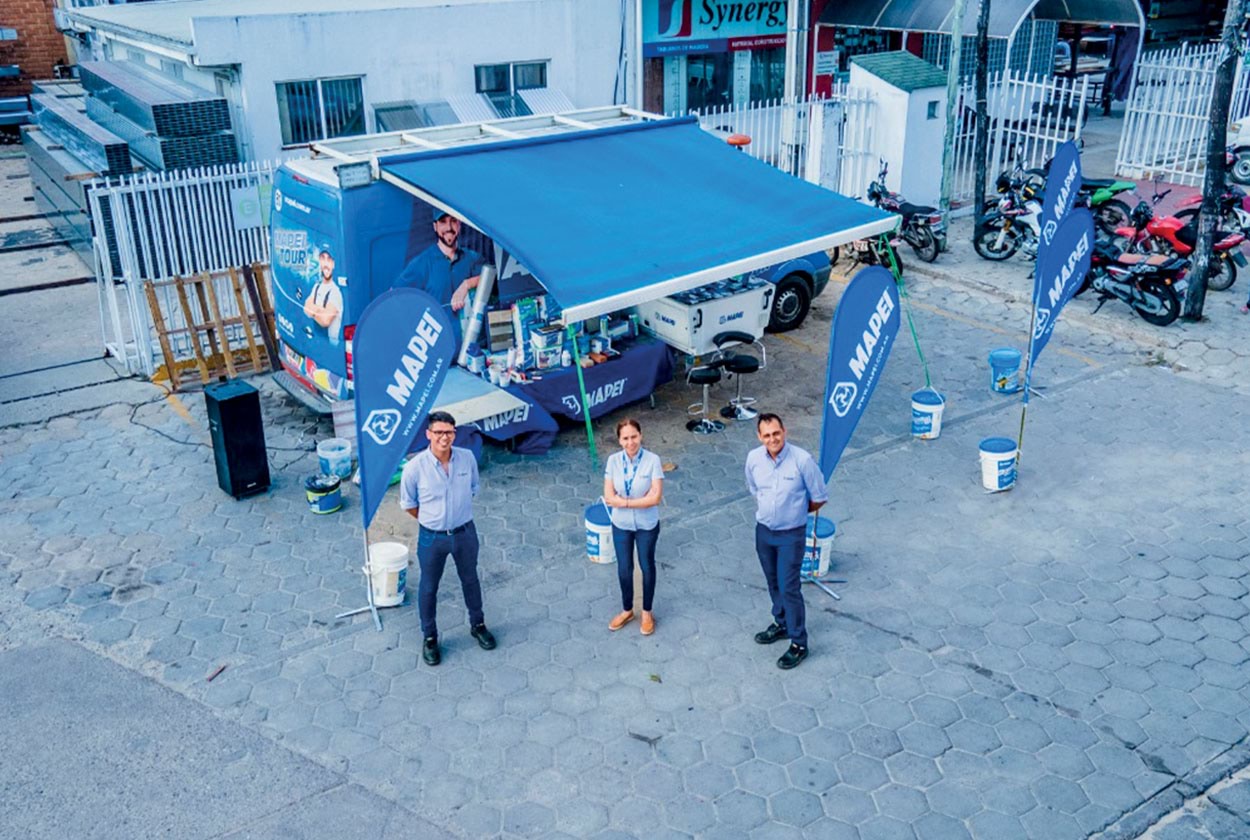
A 23-year history of growth
The Mapei Group took its first steps on the Argentine market back in the late-1990s, but it was not until 2000 that it set up a subsidiary, Mapei Argentina SA. At that time, the company had a plant in Berazategui in the province of Buenos Aires and an office about 30 km away in the town of Wilde. A real turning point for the Argentine company was the opening in mid-2006 of a manufacturing facility in Escobar, which initially had a manufacturing output of 60,000 tonnes per year and employed 60 staff. In 2009, the plant was awarded ISO 9001-2008 certification for its Quality Management System. In 2012, a Research & Development laboratory, a laboratory for concrete admixtures, and new areas for product storage were opened in the same facility. In 2014, Mapei Argentina moved its headquarters to the Escobar plant and opened a training centre. In 2018, a 1,500 m2 distribution centre was opened in Córdoba to cover the regions of Cuyo, N.O.A. (north-west Argentina) and the provinces of Santiago del Estero, La Rioja and Catamarca. In addition, the facilities of the Argentinean subsidiary were also re-awarded ISO 9001-2015 certification for their Quality Management System and ISO 14001-2015 certification for their Environmental Management System. In the same year, the company joined the Italian-Argentinian Chamber of Commerce as an active member. A new plant dedicated to the manufacture of mortars, a model of technological excellence for the whole of Latin America, has been operating in Escobar since mid-2019. The project, which saw an investment of almost 23 million Euros, also included the construction of a warehouse for finished products and raw materials covering an area of 6,000 m2.. In the same year, the Escobar site was awarded ISO 45001-2018 certification for its Occupational Health and Safety Management Systems.
SINCE 2020, MAPEI ARGENTINA HAS BEEN A SPONSOR OF CLUB ATLÉTICO LANÚS, THE SOCCER TEAM FROM THE LANÚS DISTRICT OF BUENOS AIRES THAT PLAYS IN THE PRIMERA DIVISIÓN, THE TOP DIVISION OF THE ARGENTINE LEAGUE. WITH THIS SPONSORSHIP, THE MAPEI GROUP WANTED TO STRENGTHEN, ALSO IN ARGENTINA, ITS LINK WITH SPORTS.

